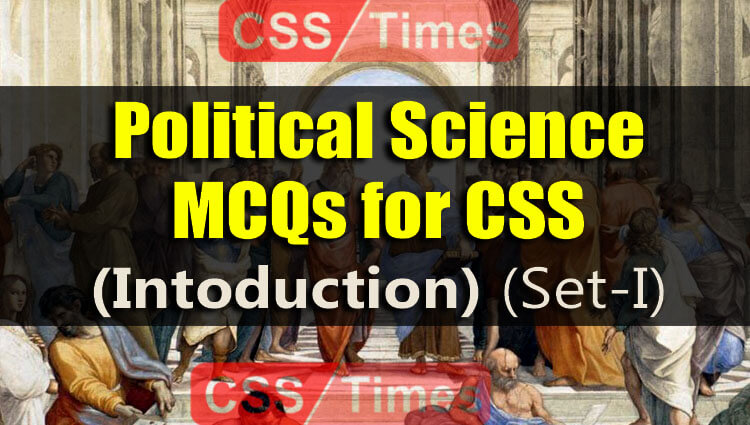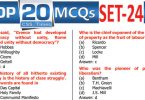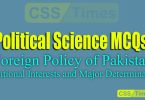Political Science MCQs for CSS, PCS | Introduction (Set-I)
The basis for acquiring citizenship through naturalization is
(a) Birth
(b) Choice
(c) Coercion
(d) Descent
Answer: b
“Polity (in the modern sense of democracy) is more stable and gives less occasion for revolution.” This statement is attributed to
(a) Cicero
(b) Plato
(c) Polibius
(d) Aristotle
Answer: d
“Self is prior to its ends” and “Right is prior to the good” are the principles upheld by
(a) Immanuel Kant
(b) F.W.G. Hegel
(c) Charles Taylor
(d) Michael Walzer
Answer: a
Essentials of enlightenment are
(a) Man is natively depraved
(b) The end of life is life itself instead or beatific life after death
(c) The first and essential condition of good life on earth is the freeing of men’s minds from the bonds of ignorance and superstitions
(d) All of these
Answer: d
The first systematic classification of government?
(a) Aristotle
(b) Plato
(c) Socrates
(d) Montesquieu
Answer: a
From which one of the following perspectives, has the notion of human rights been criticized?
(a) Universalism
(b) Cultural identity
(c) Secularism
(d) Individualism
Answer: b
Which one of the following has a close affinity to the rule of law?
(a) Martial Law
(b) Judicial supremacy
(c) Constitutionalism
(d) Separation of powers
Answer: c
Participatory democracy calls for
(a) Greater involvement of the legislatures in the business of legislature
(b) Active engagement of the representatives in the affairs of their constituencies
(c) Greater and active engagement in public governance
(d) Increasing the voter turnout in elections
Answer: c
The understanding of democracy as a mode of distributing power widely, thereby preventing its concentration in few hands is termed as
(a) Pluralist
(b) Federalist
(c) Participatory
(d) Representative
Answer: a
I am the State. Who said this?
(a) Louis XVI
(b) Aristotle
(c) F.W.G. Hegel
(d) Plato
Answer: a
Max Weber focused in his works on
(a) Constitution of states
(b) Legal structure
(c) Legitimacy of government
(d) Forms of governments
Answer: c
Benedict Anderson has characterized the nation as
(a) A daily plebiscite
(b) An imagined community
(c) The illusion of our epoch
(d) A social contract
Answer: b
Globalization is characterized by
(a) Rapid changes in information and communication
(b) Inter-dependence and inter-mixture of processes of production and culture
(c) A global infrastructural communication networks and financial institutions
(d) All of these
Answer: d
The thinker who based politics on Psychology, Physics and Geometry was
(a) Montesquieu
(b) Rousseau
(c) Thomas Hobbes
(d) Bentham
Answer: c
Who among the following justified the absolute power of sovereign on the basis of an original and irrevocable agreement of the people to surrender their nature rights to its authority?
(a) Hobbes
(b) Rousseau
(c) Austin
(d) Laski
Answer: a
‘Government of National Unity’ is a concept developed by which one of the following third world countries?
(a) Nigeria
(b) Tanzania
(c) Argentina
(d) South Africa
Answer: d
Theorists who believe that ‘state is an association of associations’ are best described as
(a) Federalists
(b) Socialist
(c) Anarchists
(d) Pluralists
Answer: d
With which one of the following can be organic conception of the State be associated?
(a) Machiavelli
(b) Aristotle
(c) Thomas Hobbes
(d) Karl Marx
Answer: b
The distinction between the private sphere of ‘family’ and the public sphere of ‘politics’ is central to which one of the following trends of thought?
(a) Athenian (Greek) philosophy
(b) Liberalism
(c) Marxism
(d) Gandhism
Answer: a
The pluralist theory view power as
(a) Control over resources
(b) A fixed quantity
(c) Relational
(d) Repressive
Answer: c
For John Stuart Mill, the central virtue of democracy was that
(a) It promotes equality among the citizens
(b) It is a government of the people and by the people
(c) It promotes the highest and harmonious development of individual capacities
(d) It encourages popular participation in decision making
Answer: c
The earlier known example of ‘direct democracy’ is found in
(a) Athens
(b) Sparta
(c) Corinth
(d) Syracuse
Answer: a
Participatory democracy seeks to enhance which one of the following?
(a) Decentralization
(b) Representation of disadvantaged sections
(c) Active citizenship
(d) Political accountability
Answer: c
Liberal democracy is based on competition and electoral choice is achieved through
(a) Political pluralism
(b) Rejection of a wide range of contending beliefs
(c) Restrictions on rival political movements
(d) Charismatic leaders
Answer: a
Which one of the following theories held the view that the State is product and Manifestation of the irreconcilability of class antagonisms?
(a) Evolutionary Theory
(b) Anarchist Theory
(c) Marxist-Leninist Theory
(d) Guild-socialist Theory
Answer: c
In Marx’s view, the social revolution begins when relations of production become a fetter upon the further development of forces of production. The ‘relations of production’, in this context, refer to
(a) Relations between the nations
(b) Relations between surplus value and absolute surplus value
(c) Relations between production and distribution
(d) Relations between the basic classes
Answer: d
Which one of the following is the most important advantage provided by the two-party system vis-à-vis multi-party system?
(a) Discipline in the party can be imposed
(b) Political activities become more transparent before the media
(c) The system gives a stable government
(d) Election expenditure incurred by the parties in the elections gets reduced
Answer: c
Check more CSS MCQs
Essential Feature of Presidential Government is
(a) Collective responsibility
(b) Separation of powers
(c) Division of powers
(d) Centralization of powers
Answer: b
Essential Feature of Parliamentary Government is
(a) Collective responsibility
(b) Separation of powers
(c) Division of powers
(d) Centralization of powers
Answer: a
Essential Feature of Federal System Government is
(a) Collective responsibility
(b) Separation of powers
(c) Division of powers
(d) Centralization of powers
Answer: c | Political Science MCQs
Essential Feature of Unitary System Government is
(a) Collective responsibility
(b) Separation of powers
(c) Division of powers
(d) Centralization of powers
Answer: d | Political Science MCQs
Dual federalism implies that
(a) National and State Governments retain separate spheres of action
(b) National and State Governments are interdependent
(c) National and State Governments are expected to collaborate in persuit of the interest of the public
(d) National and State Governments have the same function
Answer: d | Political Science MCQs
In the positive-sum game
(a) What one actor wins, the other loses
(b) Gains and losses are not necessarily equal and both the sides may gain
(c) Gains and losses are necessarily equal and both the sides gain equally
(d) Both the actors lose
Answer: b | Political Science MCQs
Check Also: Political Science MCQs (Foreign Policy of Pakistan)
Schelling’s concept of ‘mixed-motive game’ richly embodies
(a) Political and economic points of view
(b) Cultural and ideological points of view
(c) Psychological and sociological points of view
(d) Strategic and military points of view
Answer: b | Political Science MCQs
Political realism maintains autonomy of
(a) Social sphere
(b) Political sphere
(c) National sphere
(d) International sphere
Answer: b | Political Science MCQs
In his realistic theory of international politics, Morgenthau’s autonomy of political sphere denotes
(a) Autonomy of the State in international sphere
(b) Autonomy of the decision-makers vis-à-vis the legislature
(c) Autonomy of the political action in complete disregard to other standards of thought
(d) Autonomy of the policy-makers vis-à-vis other agencies or organs of the government
Answer: c | Political Science MCQs
The Marxists perceive international politics as
(a) A struggle for power between the bourgeois and socialist systems with the hope of inevitable triumph of international proletarianism
(b) A struggle for power between two nations or group of nations that can be managed by maintaining balance of power
(c) Interactions among States that can be peacefully conducted through international law and organizations
(d) Interactions among States guided and moulded by leaders of those States
Answer: a | Political Science MCQs
Decisions making theorists focus on
(a) Foreign policy decisions made by a State
(b) Impact of domestic politics on foreign policy decisions
(c) Specific decisions makers who speak and act in the name of a State
(d) Actual or objective environment that influence foreign policy decision
Answer: d | Political Science MCQs
Which of the following factors as discussed by John Burton determine a decision?
(a) Perception
(b) Expectation
(c) Information overload
(d) All of these
Answer: d | Political Science MCQs
Central feature of Immanuel Wallenstein’s work is
(a) World system
(b) Nation
(c) Regional system
(d) Underdevelopment
Answer: a | Political Science MCQs
- Political Science MCQs for CSS, PCS | Introduction (Set-I)
- Daily Top-20 MCQs for CSS, PMS, PCS, FPSC (Set-24)
- Political Science MCQs (Vladimir Lenin, Mao Zedong, Antonio Gramsci)
- Political Science MCQs (Foreign Policy of Pakistan)
- Political Science MCQs | Karl Marx
- 200 Most Wanted Political Science MCQs (One Liner)
- Political Science MCQs | John Stuart Mill, Jeremy Bentham
- Political Science MCQs | (Immanuel Kant MCQs)
- Political Science MCQs | (Jean-Jacques Rousseau MCQs)
- Political Science MCQs for CSS | John Locke MCQs







